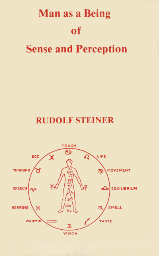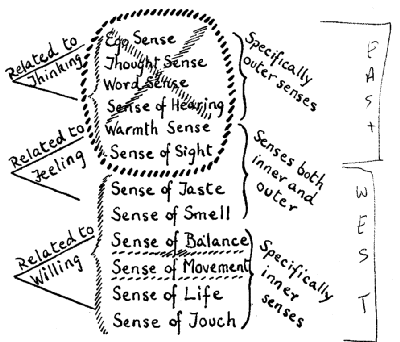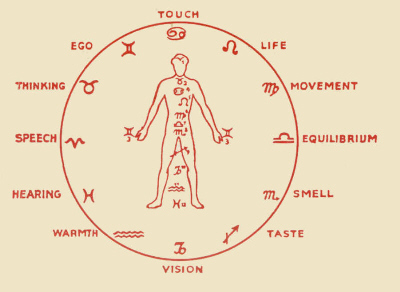[page 7, 8] We must ascribe to ourselves an ego-sense, just as we do a sense of
sight. At the same time we must be quite clear that this ego-sense is something
quite other than the development of consciousness of our own ego. Becoming
conscious of one's own ego is not actually a perception; it is a completely different
process from the process
which takes place when
we perceive another ego.
Notice the diagram from page
21 at right. The Ego Sense is at the
top and the rest of the senses follow
down to Sense of Touch at the
bottom. We have four Outer
Senses with which we solely take in
the world around us, followed by
four Senses which deal with both
Inner and Outer worlds, and lastly
four solely inner senses. We can
also notice that the first four are
related to Thinking, the second four
to Feeling, and the third four to
Willing. In addition, the top six
senses are the primary ones in the
East and the lower six senses in the
West.
In these lectures, Steiner explains the twelve senses, seven of which are completely new to most
people, such as the word sense(1).
[page 8] . . . listening to words and becoming aware of a meaning in them is
something quite different from hearing mere tone, mere sound. Although to begin
with it is more difficult to point to an organ for the word-sense than it is to relate the
ear to the sense of sound, nevertheless anyone who can really analyze the whole
field of our experience becomes aware that within this field we have to make a
distinction between the sense that has to do with musical and vocal sound and the
sense for words.
Look at the credits for any Broadway musical and there will be two prominent credits given: one for
the words (lyrics) and the other for the music, e.g., Rogers & Hammerstein, Lerner & Lowe. The two
names are tied together in our memory as if they were one person, but rather they represent the two
inextricable components of a musical number which invoke both the word sense and the hearing sense in us
as we listen to it.
In the words of others, we perceive their thinking with our sense of thought. As with the ego sense, our
perception of others' thinking differs from our own thinking.
[page 8] Further, it is again something quite different to perceive the thought of
another within his words, within the structure and relationship of his words; and
here again we have to distinguish between the perception of his thought and our
own thought. It is only because of the superficial way in which soul-phenomena are
studied to-day that no distinction is made between the thought which we unfold as
the inner activity of our own soul-life, and the activity which we direct outwards in
perceiving another person's thought. Of course, when we have perceived the
thought of another, we ourselves must think in order to understand his thought, in
order to bring it into connection with other thoughts which we ourselves have
fostered. But our own thinking is something quite other than the perception of the
thought of another person.
Clearly our materialistic science does not make such diverse distinctions, instead science sorts the
twelves senses into only five categories and blurs or ignores of them thereby. What does a materialistic
science grasp best? The sense of touch! Everywhere in this science we find weight, density, position, and
velocity calculations, all determined by the sense of touch, and those that aren't, use concepts from the
sense of touch as their basis for understanding. The most baffling concepts of modern science involve
concepts which violate our sense of touch. Examples include objects whose weight and size change when
they approach the speed of light, objects such as photons which can be in several places at the same time,
low-temperature liquids which defy gravity to climb out of their containers, and many other things. The
whole range of quantum phenomenon is filled with counter-intuitive examples which defy our sense of touch.
[page 8,9] Within the range of the senses, the sense of hearing, for example, is of
course radically different from the sense of sight or the sense of taste. And having
come to a clear conception of the sense of hearing or of the sense of sight, we then
have to recognize a word-sense, a sense of thought, and an ego-sense. Most of the
concepts current to-day in scientific treatises on the senses are actually taken from
the sense of touch. And our philosophy has for some time been wont to base a
whole theory of knowledge on this, a theory which actually consists of nothing but a
transference of certain perceptions proper to the sense of touch to the whole sphere
of capacity for sense-perception.
Here are the twelve senses laid out by Rudolf Steiner, from top to bottom, from ego sense to sense of
touch, matching the diagram above taken from page 21.
[page 9, italics added] Now when we really analyze the whole range of those
external experiences of which we become aware in the same way as we become
aware, let us say, of the experiences of sight or touch or warmth, we get twelve
senses, clearly distinguishable one from another. On earlier occasions I have
enumerated them as follows: First, the ego-sense (see diagram, p. 21) which, as I
have said, is to be distinguished from the consciousness of our own ego. By the
ego-sense we mean nothing more than the capacity to perceive the ego of another
man. The second sense is the sense of thought, the third the word-sense, the fourth
the sense of hearing, the fifth the sense of warmth, the sixth the sense of sight, the
seventh the sense of taste, the eighth the sense of smell, the ninth the sense of
balance. Anyone who is able to make distinctions in the realm of the senses knows
that, just as there is a clearly defined realm of sight, so there is a clearly defined
realm from which we receive simply a sensation of standing as man in a certain
state of balance. Without a sense to convey this state of standing balanced, or of
being poised, or of dancing in balance, we should be entirely unable to develop full
consciousness. Tenth: Next comes the sense of movement. This is the perception
of whether we are at rest or in movement. We must experience this within
ourselves, just as we experience the sense of sight. The eleventh sense is the sense
of life, and the twelfth the sense of touch.
What does it mean to have four senses which are solely outer senses?
[page 10] First, we have four senses which unite us with the outer world beyond any
doubt. They are the ego-sense, the sense of thought, the word-sense and the sense
of hearing. You will unhesitatingly recognize that when we perceive the ego of
another person, we are with our entire experience in the outer world, as also when
we perceive the thoughts or words of another. As regards the sense of hearing it is
not quite so obvious; but that is only because people have taken an abstract view of
the matter, and have diffused over the whole of the senses the coloring of a
common concept, a concept of what sense-life is supposed to be, and do not
consider what is specific in each individual sense. Of course, one cannot apply
external experiment to one's ideas upon these matters, but one has to be capable of
an inner feeling for these experiences.
What does Steiner mean by "diffusing over our senses a concept"? In Steiner's first book, Goethe's
Theory of Knowledge, he explains how concepts developed in science, such as Newton's conception that a
prism divides a light beam into its component colors. As Goethe and Steiner have both shown, this concept
stands in way of one's truly understanding color as a phenomenological event to be studied, turning it
instead into concept which drives all studies of light. In effect, Newton diffused our sense over his concept
of light. Concepts can skew our perception such that we are no long receiving unbiased data, but what we
expect to receive according to some dearly held conception.
Eyes and ears let in information and by the conception held by science, one would consider both of
them as outer perceptions. But we don't close our ears when we sleep, only our eyes. Something must be
different between the two.
[page 10] Customary thinking overlooks the fact that hearing, since its physical
medium is the air in movement, takes us straight into the outer world. And you have
only to consider how very external our sense of hearing actually is, compared with
the whole of our organic experience, to come to the conclusion that a distinction
must be made between the sense of hearing and the sense of sight. In the case of
the sense of sight we realize at once, simply by observing its organ, the eye, how
what is conveyed by this an inner process. When we sleep we close our eyes; we do
not shut our ears. Such seemingly simple, trivial facts point to something of deep
significance for the whole of human life. And though when we go to sleep we have to
shut off our inner senses, because during sleep we must not perceive through sight,
yet we are not obliged to close our ears, because the ear lives in the outer world in
a totally different way from the eye. The eye is much more a component of our
inner life; the sense of sight is directed much more inwards than is the sense of
hearing . . .
With the sense of warmth we reach the second quaternary of senses, the Inner-Outer senses, senses
which interrelate our inner and outer worlds. They are our senses of warmth, sight, taste, and smell. I was
reminded of my own sense of warmth this sunny Spring-like afternoon. We had moved our cars out of the
garage to organize it, and I got into my car to move it back into the garage. "What's that strange
experience?" I thought as I leaned over to start the motor? "Oh, I remember, it's warmth!" It's been a long
winter, and actually feeling warmth when getting into a car was a novel feeling over the past three months. I
read decades ago that a person can feel the difference of as slight as a millionth-of-a-degree, which is about
the heat added when a person enters a room where you were standing. Even though you are looking away
from the door, the minuscule incremental heat registers on the back of your neck. Without hearing anything,
you will turn around to see who it is because you have felt a warmth all the way across the room. Such a
sensitive response to a stimulus certainly deserves to be called a separate sense of warmth.
Note in the next passage which talks about "drinking acid" that the vinegar in common salad dressing
contains acetic acid.
[page 11] The next four senses, the senses of warmth, sight, taste, and smell, are so
to say on the border between outer and inner; they are both outer and inner
experiences. Just try to think of all the experiences that are conveyed to you by
anyone of these senses, and you will see how, whilst in them all there is an
experience lived in common with the outer world, there is at the same time an
experience within yourself. If you drink an acid, and thus call into play your sense
of taste, you have undoubtedly an inner experience with the acid, but you have also,
on the other hand, an experience that is directed outwards, that can be compared
with the experience of another man's ego or of the word. But it would be very bad if,
in the same way, a subjective, inner experience were to be involved in listening to
words. Just think, you make a wry face when you drink vinegar; that shows quite
clearly that along with the outer experience you have an inner one; the outer and
inner experiences merge into one another.
How can you listen objectively to someone whose very words act on you as either a delicious wine or
someone whose words are like a wine which has turned into vinegar? We might accuse the former of
"sweet-talking" us and the latter of "spewing vile words" at us. The sweetness and the vileness is not so
much in the words used, but in the way they are delivered.
[page 11] If the same thing were to happen in the case of words, if, for example,
someone were to make a speech, and you had to experience it inwardly in the way
you do when you drink vinegar or wine or something of that sort, then you would
certainly never be objectively clear about the man's words, about what he says to
you. Just as in drinking vinegar you have an unpleasant experience and in drinking
wine a pleasant one, so in the same way you would color an external experience. It
is better if you do not color the external experience when you perceive the words of
another. Rightly understood, that is just where morality comes in.
Humans who are anchored strongly into their middle senses may judge the thoughts and actions of
other with these senses. It is as if they only experience others with the senses of warmth, sight, taste, and
smell which are the primarily senses of the animal kingdom. They become like a human without a head.
[page 12] Everything becomes subjective experience. To reduce the higher senses
to the character of the lower ones is immoral. It is quite possible to bring the moral
into connection with our whole world-conception, whereas at the present time the
fact that men do not know how to build a bridge between what they call natural law
and what they call morality, acts as a destructive influence undermining our entire
civilization.
It may seem strange to some that the sense of touch falls under the rubric of an Inner Sense. After all,
when we touch something, aren't we in direct contact with the outer world of materiality? What could be
more outer than that?
[page 12, 13] When we come to the next four senses, to the sense of balance, the
sense of movement, the sense of life and the sense of touch, we come to the
specifically inner senses. For, you see, what the sense of balance conveys to us is
our own state of balance; what the sense of movement conveys to us is the state of
movement in which we ourselves are. Our sense of life is that general perception of
how our organs are functioning, of whether they are promoting life or obstructing it.
In the case of the sense of touch, it is possible to be deceived; nevertheless, when
you touch something, the experience you have is an inner experience. You do not
feel this chalk; roughly speaking, what you feel is the impact of the chalk on your
skin . . . the process can of course be characterized more exactly. In the sense of
touch, as in the experience of no other sense in the same way, the experience lies in
the reaction of your own inner being to an external process.
There is a paradox we can observe in the twelve senses: the outermost senses (1-4) are the ones we
experience most subjectively and individually; the innermost senses (9-12) are the ones we experience most
objectively. The middle senses (5-8) handle the interactions between the inner and outer world.
[page 14] Thus you see that the truly subjective senses are the senses which are
specifically external; it is they which have the task of assimilating into our humanity
what is perceived externally through them. The middle group of senses shows an
interplay between the outer and the inner world. And through the last group a
specific experience of what we are as part of the world-not-ourselves is conveyed to
us.
Milk has wonderful constructive forces for babies — that is why they can live for over a year on eating
nothing else and grow strong and healthy. Adults might naively think that such a diet would be monotonous
and unpleasant for a baby — nothing could be farther from the truth. Adults who try to save their child from
monotony by switching to solid foods as soon as possible are acting irresponsibly. Steiner says elsewhere
that milk is tasted by the entire body of the baby. That is hard for us to imagine, but the baby's entire body
is a taste organ, and its milk must taste like the most delicious ice cream might taste to us. That ability to
taste food with various parts of our body lives in us as adults, but we are unaware of it because of the
various distractions of civilization.








